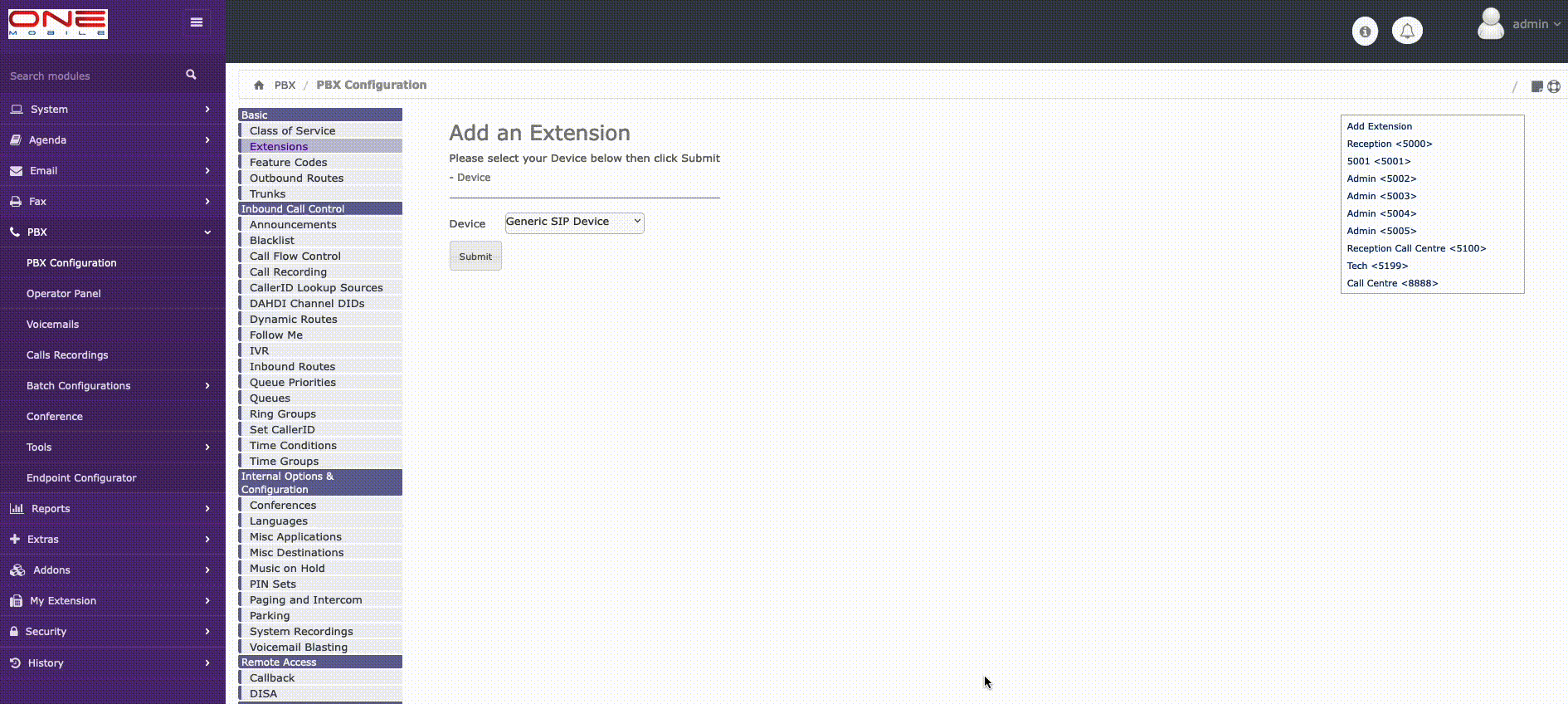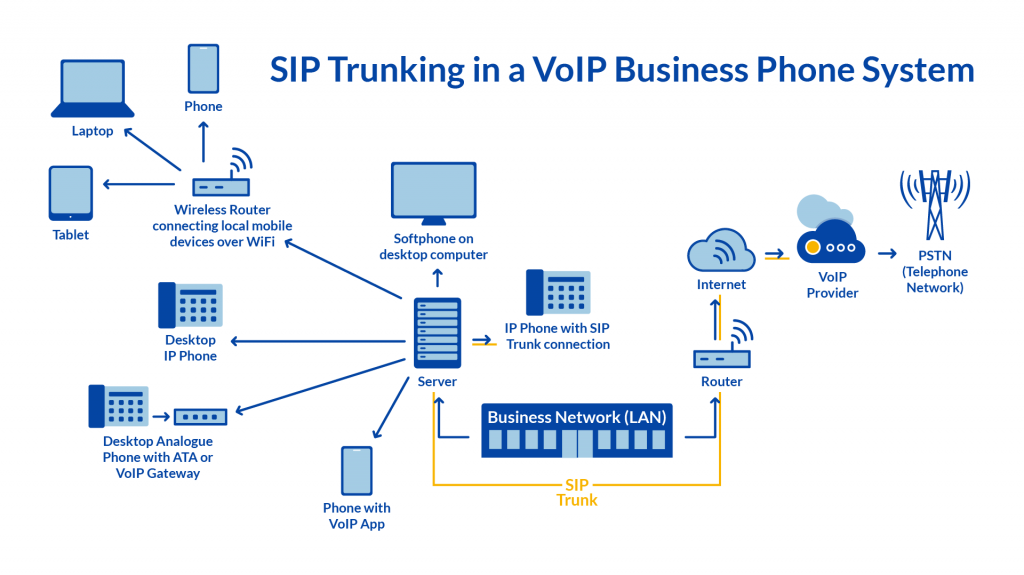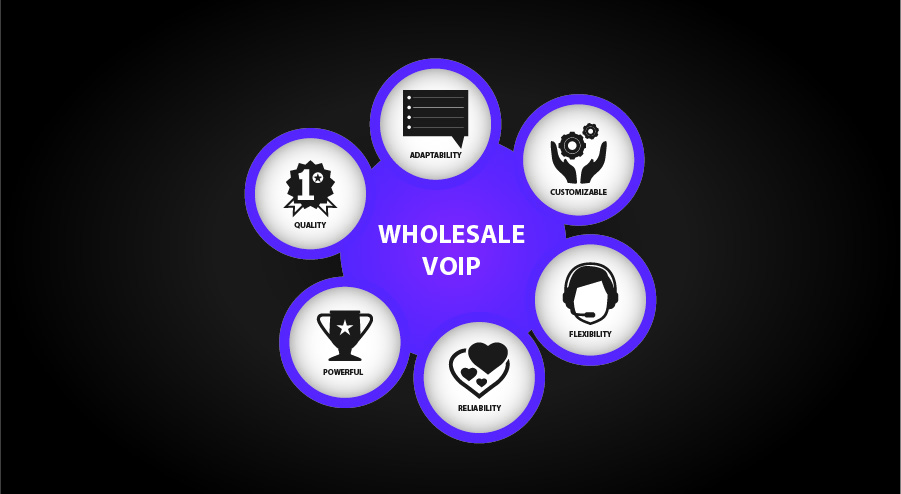- 0878222434 |
- info@omnetworks.co.za
VoIP (Voice over Internet Protocol) is a way to make telephone calls over the Internet, rather than using a traditional phone line. This allows users to make calls using their computer, smartphone, or other device, as long as they have an Internet connection. VoIP calls can be made to any phone number, including landlines and mobile phones. One of the main advantages of VoIP is that it can be much cheaper than traditional phone service, especially for long distance and international calls. Additionally, VoIP offers features like call forwarding, voicemail, and call waiting that may not be available with traditional phone service.
A VoIP (Voice over Internet Protocol) user is someone who makes phone calls using VoIP technology. This means that they use their computer, smartphone, or other device to make calls over the Internet, rather than using a traditional phone line. To make a VoIP call, a user needs an Internet connection and a device with a microphone and speakers. They can then use a VoIP app or service to make calls to any phone number, including landlines and mobile phones. VoIP users can also receive calls on their device, and may have access to features like call forwarding, voicemail, and call waiting.
VoIP is often used as an alternative to traditional phone service because it can be much cheaper, especially for long distance and international calls. It may also offer features like call forwarding, voicemail, and call waiting that may not be available with traditional phone service. Additionally, VoIP can be more convenient for users because they can make and receive calls on any device with an Internet connection, rather than being tied to a specific phone line.


A hosted PBX (Private Branch Exchange) is a phone system that is hosted and managed by a third-party service provider. Instead of hosting the PBX system on-premises, the provider maintains the system in a secure data center and allows customers to access it via the Internet. Hosted PBX systems can be used by businesses of all sizes to provide a range of communication services, including telephone calls, voicemail, call forwarding, and conference calling. One of the benefits of a hosted PBX is that it can be easily scaled up or down as needed, and it requires minimal maintenance since the provider is responsible for managing and updating the system. Additionally, hosted PBX systems often include features like call routing and auto-attendant, which can help improve the efficiency and professionalism of a business's communication capabilities.
Pricing:
A hosted PBX system works by routing phone calls over the Internet using VoIP (Voice over Internet Protocol) technology. When a user makes a call, the call is converted into digital data packets and transmitted over the Internet to the destination phone. The recipient's phone system then converts the digital data back into a traditional phone call.
In a hosted PBX system, the PBX infrastructure and management are handled by the service provider. Customers access the PBX system through a web-based interface or a specialized phone device, such as an IP phone. The provider assigns each user a unique phone number and offers a range of features, such as voicemail, call forwarding, and conference calling.
One of the benefits of a hosted PBX system is that it is highly flexible and can be easily customized to meet the needs of different businesses. For example, a company can choose the specific features it wants to use and can add or remove users as needed without having to purchase and maintain additional hardware. Hosted PBX systems are also typically more cost-effective than on-premises PBX systems, since there are no upfront hardware costs and the provider handles all maintenance and updates.
Without the need for on-location phone infrastructure and hardware, hosted PBX frees up your business to deal with much more important matters. The main advantage of setting up a hosted PBX is that setup, hardware, security, and reliability are handled by the provider. There’s no need to spend extra money on the infrastructure, IT, or switches to power your system.
Adding additional phone lines can be done quickly through the online portal. You’re not limited by the number of available phone jacks in your building’s server or telephony room. Utilizing a Hosted PBX even provides flexibility and mobility unrivaled by other systems.
Most Hosted PBX providers allow users to make calls on their desk phones, desktop softphone apps, and mobile phones. With the ability to make calls from anywhere with an internet connection, your workers can truly stay connected away from the office.
If anything goes wrong, it won’t be up to your team of Tech Support to handle the situation, but rather your service provider will be on the case. Most of the time, they’ll solve issues before you’re even aware of a problem. Between cost savings, flexibility and ease of use, choosing a hosted PBX provider is an easy step to ensure your business will maintain a high level of quality.
SIP Trunking is a service that allows businesses to make and receive phone calls over the internet using a SIP (Session Initiation Protocol) connection. It is an alternative to traditional phone lines (such as PSTN or ISDN) that uses an IP-based network to transmit voice and data. With SIP Trunking, businesses can make and receive calls using their existing PBX (Private Branch Exchange) system or VoIP (Voice over Internet Protocol) phone system, eliminating the need for separate phone lines for each phone. This can lead to cost savings for businesses, as they can often get a lower rate on calls made using SIP Trunking compared to traditional phone lines. In addition, SIP Trunking can also provide additional features such as virtual numbers, call routing, and call recording.
Pricing:
In order to use SIP Trunking, you will need the following:
A PBX or VoIP phone system that is compatible with SIP Trunking.
A SIP Trunking provider that offers a SIP Trunking service.
An internet connection with sufficient bandwidth to support your calling needs.
A router or firewall that is configured to allow SIP traffic.
IP phones or analog telephone adapters (ATAs) to connect your existing phones to the SIP Trunk.
A unique SIP address or phone number for each phone or extension that will be using the SIP Trunk.
Optionally, you may also need a session border controller (SBC) to provide security and connectivity between your network and the SIP Trunking provider's network.
SIP Trunks work by using the Internet to transmit voice and data instead of traditional phone lines. Here's how it works:
The PBX or VoIP system sends the call information to the SIP Trunk provider using the SIP protocol.
The SIP Trunk provider sends the call over the Internet to the intended recipient.
The call is received by the recipient's PBX or VoIP system, which routes the call to the appropriate extension or phone.
The call is connected, and the parties can talk to each other over the Internet using the SIP Trunk.
SIP Trunks can be used to make and receive calls to and from traditional phone lines as well as other SIP Trunks. They can also be used to connect multiple locations or PBX systems together, allowing businesses to easily make calls between different locations.
Pricing:


The wholesale VoIP provider typically handles the routing and management of calls, as well as the maintenance of the VoIP network. This allows the resellers to focus on marketing and selling their services, rather than having to build and maintain their own VoIP infrastructure.
Wholesale VoIP services can include a wide range of features, such as voice calling, video conferencing, SMS messaging, and faxing. Some wholesale VoIP providers also offer APIs (Application Programming Interfaces) that allow resellers to integrate their services with their own systems, such as CRM software or billing systems.
This is how a lot of small Business or startup companies to create their own phone systems and the cost is shared among the resellers, and providing low-cost phone service.
Residential VoIP (Voice over Internet Protocol) is a service that allows individuals to make phone calls over the internet, rather than through traditional telephone lines. Residential VoIP services typically use a router or other device to connect to the internet, and a telephone adapter (ATA) to connect a regular telephone to the internet.
With Residential VoIP, you can make and receive calls using your existing telephone number, and call quality is often better than traditional telephone service. This is because the voice data is transmitted over the internet, rather than through the public telephone network.
Residential VoIP services usually come with a variety of features and functionality, such as voicemail, caller ID, call forwarding, and three-way calling. Some services also offer advanced features such as virtual numbers, which allow you to have multiple telephone numbers that all ring to the same phone, or ring groups, which allow calls to ring to multiple phones at the same time.
One of the most significant advantages of Residential VoIP service is the cost savings, especially for international calls. Service providers offer a flat rate, bundle or even free international calls, as well as low-cost monthly plans.
Residential VoIP services are usually provided by companies specializing in VoIP, rather than traditional telephone companies. Many of these companies offer their services on a subscription basis, and you can easily find the plans and pricing information on their website.
Chatbot development is simple with our no-code chatbot builder, and our templates make it even easier!
A chatbot is a computer program designed to simulate conversation with human users, especially over the Internet. Chatbots are often used to help answer customer questions, provide customer service, or assist with online transactions. Some chatbots use artificial intelligence and machine learning to understand and respond to user input, while others follow a pre-determined script. Chatbots can be found on websites, messaging apps, and other platforms, and they are often used in customer service and other industries where they can help improve efficiency and provide immediate assistance to users.
Here are many ways that chatbots can be designed and implemented, but most chatbots use some combination of natural language processing, machine learning, and pre-determined scripts to understand and respond to user input.
Here's a simplified overview of how a chatbot might work:
A user interacts with the chatbot through a messaging platform or chat interface, typing in a message or issuing a command.
The chatbot receives the message and processes it, using natural language processing (NLP) to understand what the user is saying.
The chatbot compares the user's message to a list of pre-determined triggers or keywords that it has been programmed to recognize.
If the user's message matches a trigger, the chatbot responds with a pre-determined script or set of instructions.
If the user's message does not match a trigger, the chatbot may use machine learning or other advanced techniques to try to understand the user's intent and generate a response.
The chatbot sends its response back to the user, and the conversation continues until the user ends the interaction or the chatbot determines that the conversation is complete.
Some chatbots are more sophisticated than others and may use more advanced techniques to understand and respond to user input. For example, a chatbot that uses artificial intelligence (AI) may be able to learn from its interactions with users and improve its responses over time.


A call centre is a centralized office where customer and other telephone calls are handled by a group of people who are trained to handle a high volume of calls efficiently. Call centers are typically used by businesses to handle customer service, sales, and technical support calls. Call center agents are responsible for answering calls, responding to customer inquiries, and assisting customers with any issues they may be experiencing. They may also be responsible for making outbound calls to customers or potential customers for sales or other purposes.
Get in your inbox the latest News